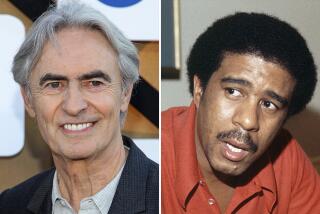A stand-up guy
- Share via
Stumbling comedians have grabbed the crutch of free-speech martyrdom often enough that we should recall one central fact about the late George Carlin: He was an artist and linguistic provocateur, but he never set out to create a new law of speech.
The respondent in the landmark 1978 Supreme Court case over his “Filthy Words” bit was not Carlin but a public radio network that had played the routine during a midafternoon show about censorship. Carlin, having begun his career as a clean-cut observational comic (a point ‘70s-era Mad magazine effectively used against him in its parody “Cool Carnal, Campus Comedian of the Year”), enjoyed a long, lustrous career as the kind of beloved anti-establishmentarian you’d trust to play Thomas the Tank Engine’s Mr. Conductor. His funniest routine -- a side-by-side comparison of baseball and football -- wasn’t even dirty. The comedian didn’t push the limits of free speech so much as explore the borders of our word choices and the ludicrousness of those who would regulate those choices.
This predilection helped keep Carlin funny as he made the seemingly inevitable but never welcome transition from enfant terrible to cranky curmudgeon. His best later material continued to consider the difference between polite language and impolite reality (“negative cash flow position” as a substitute for “broke,” for example). Beneath his darkening testiness, Carlin retained his knack for finding the absurdity in any given phrase.
The decision in FCC vs. Pacifica was written by Justice John Paul Stevens, who went on to become the high court’s leading liberal. As with most efforts to put a moderate face on the suppression of speech, the ruling ended up muddying, rather than clarifying, the legal environment. The Federal Communications Commission never grew comfortable with putting together a list of unspeakable words, nor was it willing to say precisely which hours were OK for broadcasting grown-up language and which were not.
Carlin, whose real target was the nudge-and-wink culture that traffics in euphemism while obsessing about what’s appropriate to say, appreciated nuances like that. You can’t say the “f-word” on TV, he noted, yet without coy references to sexual congress, bedroom mix-up plots and lewd bantering with honeymooning couples, there wouldn’t be much TV at all.
More to Read
The biggest entertainment stories
Get our big stories about Hollywood, film, television, music, arts, culture and more right in your inbox as soon as they publish.
You may occasionally receive promotional content from the Los Angeles Times.










